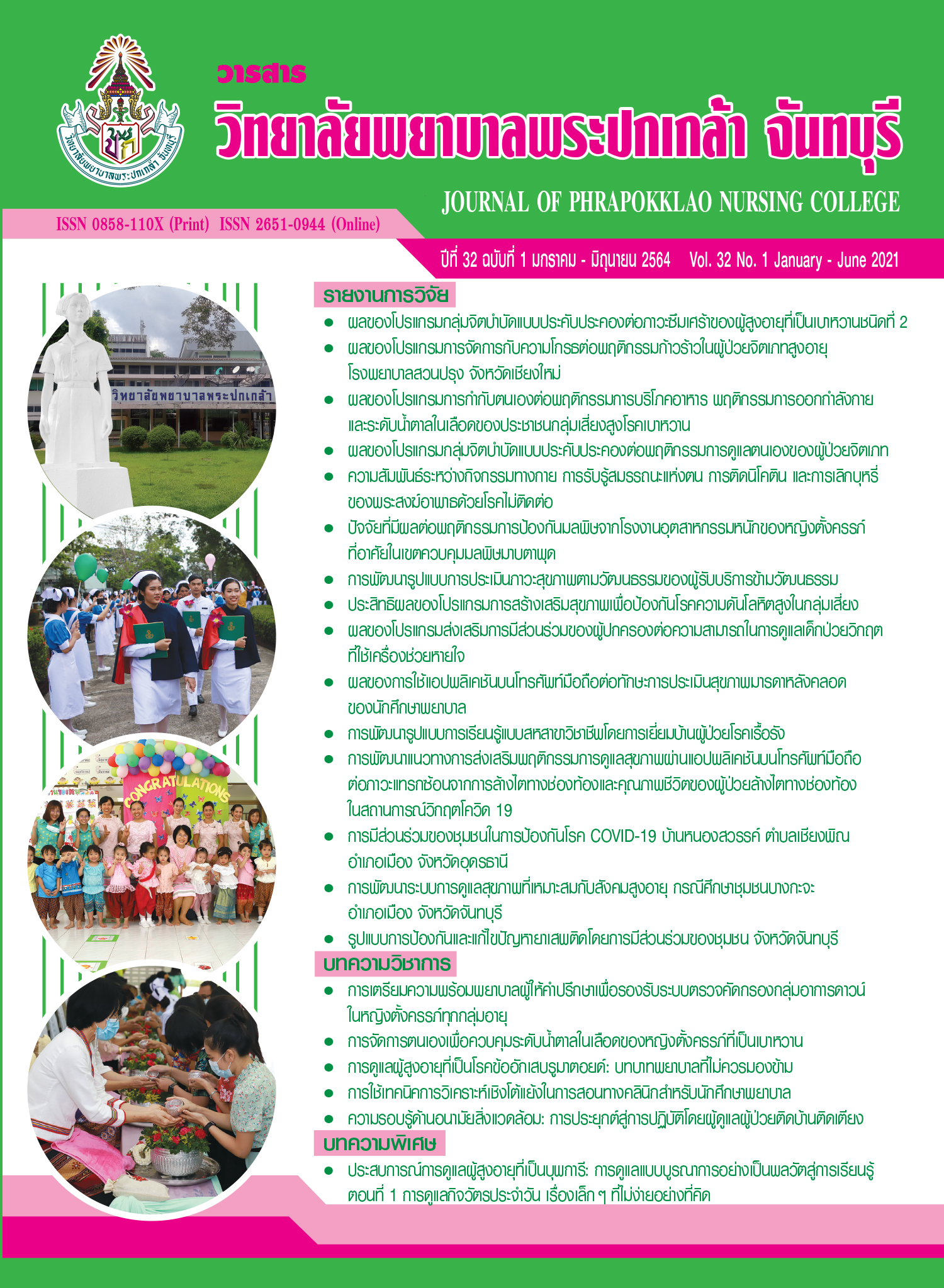The Argument Analysis Techniques in Clinical Teaching for Nursing Students
Keywords:
Argument analysis, Critical thinking, Nursing students, Clinical teachingAbstract
The nursing profession is dealing with the life span of a human being from birth to death. In the practice of nursing, science and arts must be integrated in a holistic manner. Nurses have to learn all the time to develop the knowledge and necessary skills for the ages. The development of nursing students to enhance 21st-century skills; learning and innovation skills, especially critical thinking and problem-solving, are essential and vital to determine the readiness of nursing students to enter the complex world of work and face the pressures of society’s high expectations. An argument analysis is a technique that helps develop critical thinking, to know and understand things, became more profound a new body of knowledge. Because of how the process of argument analysis, there must be a search for various pieces of evidence to dispute the previous claim, or to support their ideas with principles, causing widespread criticism and scrutiny. The reliability of the evidence is selected and evaluated until leading to the correct conclusions with evidence support. One of the nursing science program’s goals is to produce nursing graduates with critical thinking to succeed in becoming a qualified practitioner. Therefore, applying argument analysis techniques to clinical teaching is one of how nursing students critically-minded and achieve their desired goals.
References
ทรงฤทธิ์ ทองมีขวัญ, และวรินทร์ลดา จันทวีเมือง. (2562). การบริหารรายวิชาเพื่อพัฒนาทักษะทางคลินิกในการรักษาโรคเบื้องต้นสำหรับนักศึกษาพยาบาล. วารสารพยาบาลกระทรวงสาธารณสุข, 29(3), 30–38.
ทรงฤทธิ์ ทองมีขวัญ, และสกุนตลา แซ่เตียว. (2561). ผลการจัดการเรียนการสอนแบบสัมมนาต่อการเรียนรู้การรักษาโรคเบื้องต้น กลุ่มอาการหายใจเหนื่อยหอบของนักศึกษาพยาบาล. วารสารเครือข่ายวิทยาลัยพยาบาลและการสาธารณสุขภาคใต้, 5(1), 74–90.
ธนพล บรรดาศักดิ์, กนกอร ชาวเวียง, และนฤมล จันทรเกษม. (2560). ความสุขในการเรียนรู้ของนักศึกษาพยาบาล. วารสารสันติศึกษาปริทรรศน์ มจร, 5(1), 357–369. doi:10.14456/jmcupeace.2017.28
พาอีหม๊ะ เจะสา. (2561). ผลของการจัดการเรียนรู้ด้วยรูปแบบการสืบเสาะแบบมีการโต้แย้งที่มีต่อผลสัมฤทธิ์ทางการเรียนชีววิทยา การคิดวิเคราะห์ และความพึงพอใจต่อการจัดการเรียนรู้ ของนักเรียนชั้นมัธยมศึกษาปีที่ 4 (วิทยานิพนธ์ปริญญามหาบัณฑิต). มหาวิทยาลัยสงขลานครินทร์ วิทยาเขตปัตตานี. สืบค้นจาก http://kb.psu.ac.th/psukb/bitstream/2016/12159/1/TC1544.pdf
มลฤดี แสนจันทร์, ผดุงศิษฎ์ ชำนาญบริรักษ์, และสัมฤทธิ์ ขวัญโพน. (2557). สภาพการศึกษาภาคปฏิบัติรายวิชาปฏิบัติการรักษาพยาบาลเบื้องต้น กรณีศึกษาโรงพยาบาลชุมชน. วารสารวิทยาลัยพยาบาลบรมราชชนนี นครราชสีมา, 20(2), 70–81.
วนิดา ผาระนัด, และประสาท เนืองเฉลิม. (2561). การโต้แย้งอย่างมีเหตุผล: ทักษะเพื่อการดำรงชีวิตในศตวรรษที่ 21. วารสารมนุษยศาสตร์และสังคมศาสตร์ มหาวิทยาลัยมหาสารคาม, 37(2), 174–181.
วันเพ็ญ สุลง. (2561). การเรียนรู้โดยใช้กรณีศึกษา เพื่อส่งเสริมการคิดวิเคราะห์ วิชา การบริหารงานคุณภาพในองค์การ ระดับประกาศนียบัตรวิชาชีพชั้นสูง ชั้นปีที่ 2 (วิทยานิพนธ์ปริญญามหาบัณฑิต). กรุงเทพฯ: มหาวิทยาลัยธุรกิจบัณฑิตย์. สืบค้นจาก http://libdoc.dpu.ac.th/thesis/Wanpen.Sal.pdf
วิจิตรา กุสุมภ์, และสุลี ทองวิเชียร. (2560). การพัฒนาทักษะการคิดอย่างมีวิจารณญาณของนักศึกษาพยาบาล. วารสารคณะพยาบาลศาสตร์ มหาวิทยาลัยบูรพา, 25(3), 1–8.
วิจิตรา กุสุมภ์, และอรุณี เฮงยศมาก. (2562). ผลของการเรียนรู้โดยใช้กรณีศึกษาเป็นฐานต่อความคงทนในการเรียนรู้ของนักศึกษาพยาบาล. วารสารวิชาการ มหาวิทยาลัยกรุงเทพธนบุรี, 8(1), 187–196.
สมเกียรติ สุทธรัตน์, และพัชนี สมกำลัง. (2556). ความสามารถในการคิดอย่างมีวิจารณญาณของนักศึกษาหลักสูตรพยาบาลศาสตรบัณฑิต และหลักสูตรพยาบาลศาสตรบัณฑิต (ต่อเนื่อง 2 ปี) วิทยาลัยพยาบาลบรมราชชนนี นครพนม. วารสารพยาบาลกระทรวงสาธารณสุข, 22(1), 61–67.
เอกภูมิ จันทรขันตี. (2559). การจัดการเรียนการสอนเพื่อส่งเสริมทักษะการโต้แย้งในชั้นเรียนวิทยาศาสตร์. วารสารมหาวิทยาลัยราชภัฏยะลา, 11(1), 217–232.
Arrue, M., Unanue, S., & Merida, D. (2017). Guided university debate: Effect of a new teaching-learning strategy for undergraduate nursing students. Nursing Education Today, 59, 26–32. doi:10.1016/j.nedt.2017.08.011
Cullen, S., Fan, J., van der Brugge, E., & Elga, A. (2018). Improving analytical reasoning and argument understanding: A quasi-experimental field study of argument visualization. Nature Partner Journals Science of Learning, 3(1), 1–6. Retrieved from https://www.nature.com/articles/s41539-018-0038-5
Handayani, P., Sinaga, P., & Feranie, S. (2018). Feasibility of physics teaching materials oriented on cognitive ability and argumentation skill of student. Journal of Physics: Conference Series, 1157(3), 1–5. doi:10.1088/1742-6596/1157/3/032039
Hartin, P., Birks, M., Bodak, M., Woods, C., & Hitchins, M. (2017). A debate about the merits of debate in nurse education. Nurse Education in Practice, 26, 118–120. doi:10.1016/j.nepr.2017.08.005
Lin, S.-S., & Mintzes, J. J. (2010). Learning argumentation skills through instruction in socioscientific issues: The effect of ability level. International Journal of Science and Mathematics Education, 8(6), 993–1017. doi:10.1007/s10763-010-9215-6
Najafi, M., Motaghi, Z., Nasrabadi, H. B., & Heshi, K. N. (2016). “Debate” learning method and its implications for the formal education system. Educational Research and Reviews, 11(6), 211–218. doi:10.5897/ERR2015.2316
Nisly, S. A., Kingdon, L. K., Janzen, K. M., & Dy-Boarman, E. A. (2017). Using debates to mimic clinical discussion in experiential education. Innovations in Pharmacy, 8(4), 1–9. Retrieved from https://pubs.lib.umn.edu/index.php/innovations/article/view/935/1015
Noviyanti, N. I., Mukti, W. R., Yuliskurniawati, I. D., Mahanal, S., & Zubaidah, S. (2019). Students’ scientific argumentation skills based on differences in academic ability. Journal of Physics: Conference Series, 1241, 1–8. doi:10.1088/1742-6596/1241/1/012034
Pan, L., Xi, H-Q., Shen, X-W., & Zhang, C-Y. (2018). Toolbox of teaching strategies. Frontiers of Nursing, 5(4), 249–255. doi:10.1515/fon-2018-0033
Popil, I. (2011). Promotion of critical thinking by using case studies as teaching method. Nurse Education Today, 31(2), 204–207. doi:10.1016/j.nedt.2010.06.002
Thabet, M., Taha, E. E., Abood, S. A., & Morsy, S. R. (2017). The effect of problem-based learning on nursing student’ decision making skills and styles. Journal of Nursing Education and Practice, 7(6), 108–116. doi:10.5430/jnep.v7n6p108
Toor, R., Samai, K., & Wargo, R. (2017). Debate as an alternative method for medical literature evaluation. Currents in Pharmacy Teaching & Learning, 9(3), 427–432. doi:10.1016/j.cptl.2017.01.009
Zeng, H. L., Chen, D. X., Li, Q., & Wang, X. Y. (2020). Effects of seminar teaching method versus lecture-based learning in medical education: A meta-analysis of randomized controlled trials. Medical Teacher, 42(12), 1343–1349. doi:10.1080/0142159X.2020.1805100
Downloads
Published
How to Cite
Issue
Section
License
Copyright (c) 2021 JOURNAL OF PHRAPOKKLAO NURSING COLLEGE

This work is licensed under a Creative Commons Attribution-NonCommercial-NoDerivatives 4.0 International License.
เนื้อความ ข้อมูล และรายการอ้างอิงที่ผู้เขียนใช้ในการเขียนบทความเพื่อลงตีพิมพ์ในวารสารวิทยาลัยพยาบาลพระปกเกล้า จันทบุรี ถือเป็นความคิดเห็นและความรับผิดชอบของผู้เขียน คณะผู้จัดทำวารสารไม่จำเป็นต้องเห็นพ้องด้วยหรือร่วมรับผิดชอบ
บทความที่ได้รับการลงตีพิมพ์ในวารสารวิทยาลัยพยาบาลพระปกเกล้า จันทบุรี ถือเป็นลิขสิทธิ์ของวารสารวิทยาลัยพยาบาลพระปกเกล้า จันทบุรี หากหน่วยงานหรือบุคคลใดต้องการนำส่วนหนึ่งหรือทั้งหมดของบทความไปเผยแพร่ต่อเพื่อวัตถุประสงค์ใด ๆ จะต้องได้รับอนุญาตจากบรรณาธิการวารสารก่อน



